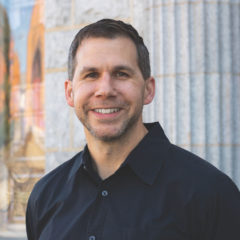Life is filled with significant lessons.
When you think back over your life, what would you say are some of the biggest lessons you have learned? Even more importantly, how did you learn those lessons?
I have asked this question many times and in many places over the years. Sometimes people give very profound answers. They mention things such as “learning team work” or “learning how to care for a loved one.” Sometimes people give more simple answers such as “learning how to do the laundry” or “how to drive a car.”
It is always fun to hear what people come up with when they think of significant lessons learned in their lifetimes. However, what I am most anxious to hear from people is how they learned those lessons. Inevitably, the answer to how people have learned the most powerful lessons in their lives come back to one common factor—and that is another person who instructed them or modeled for them how to live into that lesson.
In all my years of asking these questions I do not think there has been one time where someone said, “The most significant lesson I learned came from a book, or class, or written set of instructions.”
“Inevitably, the answer to how people have learned the most powerful lessons in their lives come back to one common factor—and that is another person who instructed them or modeled for them how to live into that lesson.”
No doubt books, classes, and written instructions are helpful and needed in life. We need directions on how to assemble pieces of furniture, or how to clean the oven, or how to follow a new recipe when no one else is around.
However, over and over again we discover that life’s most important lessons are shared with us in the more informal manner of relationships, mentoring, and discussion rather than the more formal manner of written sets of instructions, professional lectures, or filling in correct answers on a test.
Jesus’ Approach to Discipleship
It is ironic, then, when it comes to learning the lessons of the faith in discipleship, as followers of Christ, that the church so often still expects to foster discipleship in the more formal manners of organized Bible studies, professional sermons, and church programs/classes.
To be clear, these are good and often needed pursuits in the growth of discipleship for Jesus followers. There are even times in scripture when we see these more formal avenues of discipleship exemplified. Jesus shared his first sermon at a synagogue (as the designated religious space of the day) quoting the Book of Isaiah (Luke 4:16-21). Jesus later shared in the Sermon on the Mount (Matthew 5-7) to a large crowd that had gathered.
However, more often than not when we walk through the Gospels, we see Jesus fostered discipleship in his followers not through formal means (we never see Jesus instruct His disciples to take out their quills and parchment to answer the correct questions on a discipleship quiz), but through more informal means.
Over and over in Scripture we see Jesus having conversation with His disciples, answering questions about what parables meant, and instructing the disciples themselves to go and heal and teach. Repeatedly we see Jesus modeling distinct practices for His disciples such as early morning prayer, Sabbath rest, healing, eating, and sharing while He moved from one location to another.
On the final night of His life, Jesus gathered His disciples together for one final meal. There He not only prayed for them and shared what was upon His heart, He also offered the distinct practices of footwashing and the elements of the Last Supper. On the last night of His life, Jesus engaged with His disciples through eating, sharing, and sacrificing rather than through exegesis, a polished Bible study, or fill-in-the-blank answers for a particular class lesson.
Where is Informal Discipleship in Churches?
If this model of informal discipleship is what Jesus practices so much of the time to help His followers grow in discipleship, why then, do so many churches today seek to foster a robust discipleship in their congregations through almost exclusively formal means? And then, why are we in the church world surprised that we so often see such an anemic form of discipleship when all we have offered are formal avenues of learning?
We live in an age when people often feel overwhelmed and time is at a premium. Formal forms of discipleship tend to be more “efficient” where set classes or programmatic experiences are offered with clear beginnings and endings. Informal discipleship, on the other hand, is often more messy and more time-intensive. Whereas formal discipleship often requires thinking and reflection, informal discipleship frequently requires putting that thought into action.
Thus we tend to default to more formal forms of discipleship in many of our local church settings because it is more efficient, less demanding, and can more easily be controlled than informal discipleship.
APEST and the Neglected APEs
In his book The Forgotten Ways, Alan Hirsch draws on Ephesians 4:11-12 to describe APEST or apostles, prophets, evangelists, shepherds, and teachers, a framework for thinking about discipleship. In this framework, Hirsch points out that many churches today have focused well on the shepherding and teaching offices (which lend themselves well to formal types of discipleship) but have neglected the “APEs”, apostolic, prophetic, and evangelistic offices (which lend themselves to more informal types of discipleship). As a result many churches have defaulted into a discipleship framework in which they can discuss their belief in discipleship while not actually practicing much discipleship.
Some years ago this reality hit close to home for me. I had created what I considered to be our most robust discipleship program for our church. On the last evening of this discipleship class, one of our most mature disciples looked at me and completely seriously asked: “Is this it?”
Meeting People on Their Turf
What he was really asking me in that moment was, “Is learning these discipleship concepts and lessons here in the church facility all we are offering when it comes to following Jesus? What about meeting people on their turf? Sharing the gospel good news with those who do not yet know it? Experimenting with new ways of engaging people? Sacrificing? Sharing our testimony? Serving our community? Putting faith into action through distinctive practices?” What he was really asking me was, “Are we simply going to continue doing formal discipleship or will we also learn to live into informal discipleship”
While we still have a long way to go, that one question of, “Is this it?” has caused us to take a radical look at how we are seeking to live into discipleship as an entire church. It’s not that formal discipleship is bad (it is quite good actually!). But we also need to embrace informal forms of discipleship with the formal so that the “norm” of discipleship is a way of life modeled in the example of Jesus Himself.
A life of discipleship in Christ was never meant to end with the question of “Is this it?” When we live lives of formal and informal discipleship our lives never will end with that question. Rather our lives (and those around us) will be filled with the powerful, loving, significant, and transformative reality rooted in the love of Jesus Christ.


